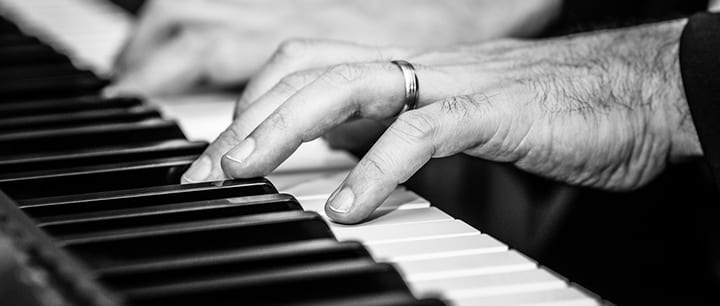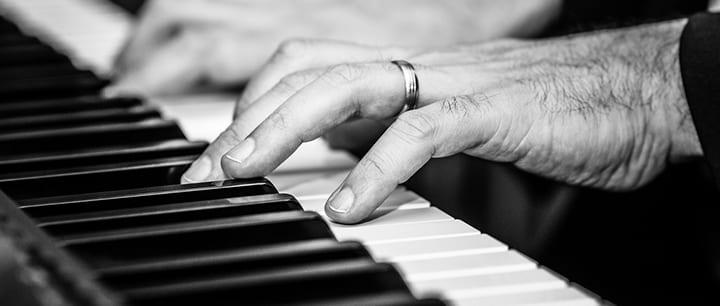 Piano may be one of the toughest instruments to learn, because of all the multitasking required! You have to be able to read two different musical lines simultaneously, and keep track of what both your left and right hands are doing, all while your foot works the pedals. While most schools have classes to teach students band instruments or stringed instruments, few schools offer piano instruction. This means that most piano students learn how to play at home and in private piano lessons, instead of in a social environment.
Piano may be one of the toughest instruments to learn, because of all the multitasking required! You have to be able to read two different musical lines simultaneously, and keep track of what both your left and right hands are doing, all while your foot works the pedals. While most schools have classes to teach students band instruments or stringed instruments, few schools offer piano instruction. This means that most piano students learn how to play at home and in private piano lessons, instead of in a social environment.
Whether you want to help your child get a head start, or you’re an adult interested in picking up a new hobby, there are a number of tools that can help you as you learn piano at home. From the classic metronome to modern online tools, here are useful tools to have at hand:
Metronome
As you learn piano at home, you will probably need help keeping the right tempo. Orchestras have conductors to help them keep time during practice, and marching bands have drum majors. For the piano player who seldom has the opportunity to play with others, it can be difficult to keep time in addition to remembering everything else! With a metronome, though, you can set the pace as you’re practicing a new piece. Besides the classic metronome, there are also electronic pendulums and metronome apps available, so you can choose one that best meets your needs.
Flashcards
Flashcards can be a huge help as you begin to learn the notes, tempos, scales, and markings on your piano music. You can review which accidentals are used in each scale, which keys go with which notes on the page, or even review the meaning of terms like allegro and adagio. Even if you learn piano at home, you will be expected to be able to read all of these during a recital or audition.
Book of Scales
Although it isn’t exactly a tool, more like a staple, it’s impossible to overstate the importance of learning scales! Being able to recognize them with flashcards is very helpful, but nothing compares to actually playing and practicing all of the scales. Doing this is a great way to warm up your fingers before moving on to actual pieces.
Chord Charts
Chords are as important as scales, and they can be even harder to learn. Not only do you have to get comfortable with the different ways to stretch your hands, you have to be able to play the right notes every time. You don’t have to spend too long on these every day, but when you first get started, it’s best to take a bit of time out of your practice to play a couple sets of chords.
Piano Apps
There are a lot of different apps that can help you learn piano at home. Some combine metronomes and chords, making them a one-stop resource for multiple tools. This can be particularly helpful in the beginning when you are still learning how to read music. Keep in mind, though: if you use technology as you practice, make sure it serves only to help, not to distract!
One good app to start with is TakeLessons Live. The free app offers online classes that are led by live piano teachers. It allows you to join a variety of classes from anywhere in the world. Topics covered include finger exercises, music theory, scales, and more.
Practice Log
Routines are one of the best ways to ensure you review everything you need to on a regular basis. When you first start, dedicate a few minutes to the basics, like scales and chords, and record how much time you spend on them. Make sure to note which scales you are learning, and also go back over the ones you have already mastered. Scales and chords may not be the most fun to practice, but even the most accomplished pianist should play them regularly. Keep a record of what you played, including which pieces you practice, and how long you spent on it. You will be surprised at how quickly you are able to reduce the amount of time you spend on the basics and begin to focus more on the pieces you want to play.
Pianists have to spend most of their time practicing alone. No matter how much time you spend practicing, the only way to get an objective assessment of your progress is through a teacher. A great piano teacher can help you learn faster and cater the process to your needs and learning style. Ready to get started? Search for a piano teacher near you!
Photo by Tekke
Megan L.
